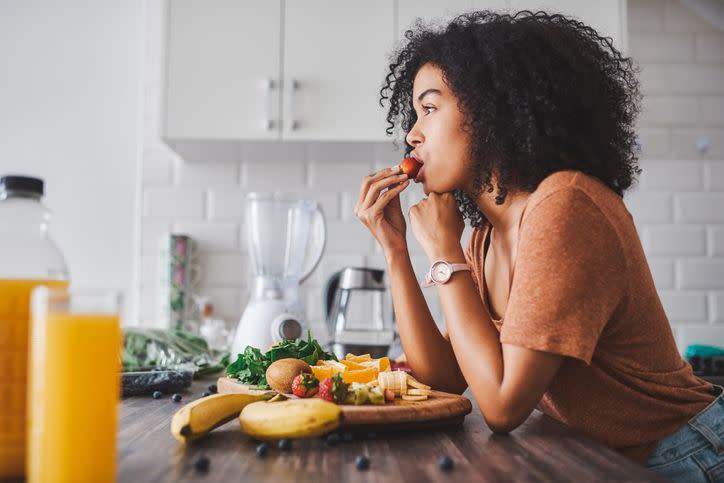Why Am I So Hungry on My Period?

Moyo Studio / Getty Images
Medically reviewed by Dr. Andrea L. Braden
You are not alone if you have ever wondered, "Why am I so hungry on my period?" You may be hungrier than usual and crave certain foods right before your period. Premenstrual syndrome (PMS) is a combination of symptoms that many people get about a week or two before their period. Appetite changes and food cravings are common PMS symptoms.
Is it normal to be more hungry around your period? Yes, hormone changes lead to an increased appetite. The hormone progesterone rises after ovulation, or when an ovary releases an egg. This change may make you hungrier. Serotonin, a hormone that affects mood, decreases around the same time. You may crave a sweet treat to help boost your mood.
It's OK to indulge in your food cravings now and then, including before your period. You can manage these cravings with a balanced, nutrient-rich diet. Read on to learn how the menstrual cycle affects appetite and how to manage cravings.
Related: 12 Reasons Why You're Always Hungry
Menstrual Cycle Phases
The menstrual cycle describes the monthly hormone changes the body goes through to prepare for a possible pregnancy. The first day of a period marks the first day of the menstrual cycle, which lasts about 28 days on average. The menstrual cycle can range in length, however, from 21 days to about 35 days.
The menstrual cycle includes four phases:
Menstrual: This is the first stage of the menstrual cycle when you actively have your period.
Follicular phase: This phase starts on the first day of your period and ends when you ovulate.
Ovulation: This is when an ovary releases a mature egg, usually toward the middle of your menstrual cycle.
Luteal phase: This occurs after a follicle in the ovary releases the egg and changes into the corpus luteum. This temporary group of cells releases hormones that keep the uterine lining thick and ready for a fertilized egg to implant.
Hormones That Affect Appetite Before and During Period
You may have an increased appetite during the luteal phase, which starts with ovulation. A study published in 2016 measured the dietary intake of over 250 women aged 18 to 44 for two menstrual cycles. The researchers found an increased intake of protein, specifically animal protein, and reported food cravings during the luteal phase.
Another study published in 2017 looked at the eating habits, weight fluctuations, and hormone levels of 30 women aged 18 to 45. The study authors found that women ate significantly more before their periods. The average daily calorie intake rose from 1,688 during the follicular phase to 2,164 during the luteal phase. Carbs accounted for most of the extra calories.
The hormone progesterone, which begins to rise after ovulation, can increase appetite. Progesterone helps prepare the body to implant and nourish a fertilized egg. A menstrual period follows if a pregnancy does not occur.
Other hormones counterbalance progesterone's effects on appetite. Leptin, a hormone that suppresses appetite, rises during the second half of the menstrual cycle.
Why Do I Crave More Sugary Foods and Carbs?
Research has shown that people may have significant cravings for chocolate, sweets, and salty foods in the late-luteal phase. Serotonin decreases during this time. Serotonin is a hormone that can affect mood and cause physical symptoms.
You may crave sugary foods and carbs to help boost your mood when serotonin is low. The fat and sugar content in chocolate, for example, helps replenish serotonin levels in the brain and elevate your mood.
Do You Need More Calories on Your Period?
Most people who menstruate burn slightly more calories than normal during the luteal phase. That's because your resting metabolic rate (RMR) changes throughout the menstrual cycle. RMR is the energy your body uses when resting.
A review published in 2020 looked at metabolic changes during the menstrual cycle. The researchers looked at 26 studies involving 318 women. About 47% of these studies reported an increase in RMR during the luteal phase compared to the follicular phase. Basal metabolic rate (BMR), in contrast, steadily decreases during menstruation until one week before ovulation. BMR is the energy your body requires to function at rest.
It's unclear why RMR increases. Mechanisms may be in play, preparing the body for a possible pregnancy. These mechanisms utilize more energy than normal. This change, however, is minimal and does not cause significant calorie-burning during your period.
How To Manage Cravings
It's perfectly OK to indulge in your food cravings from time to time, including before your period. Here are some ways to manage your food cravings before your period:
Boost your calcium intake.
Choose fruit if you are craving something sweet.
Consume protein, which helps satisfy your cravings.
Drink plenty of fluids.
Eat small meals frequently throughout the day.
Opt for fiber-rich foods that keep you full for long periods.
Related: What Is 'Hangry'? Feeling Angry After Not Eating Is a Real Thing
A Quick Review
Increased appetite and food cravings right before your period are normal. Your body goes through several changes (between puberty and menopause) to prepare for a possible pregnancy. Hormones rise and fall during this time. Some of these hormonal changes might affect your appetite.
Eating a balanced, nutrient-rich diet of fiber, fruit, and protein can help curb food cravings. Do not be afraid to indulge in a sweet treat or extra carbs during this time of the month.
For more Health.com news, make sure to sign up for our newsletter!
Read the original article on Health.com.

